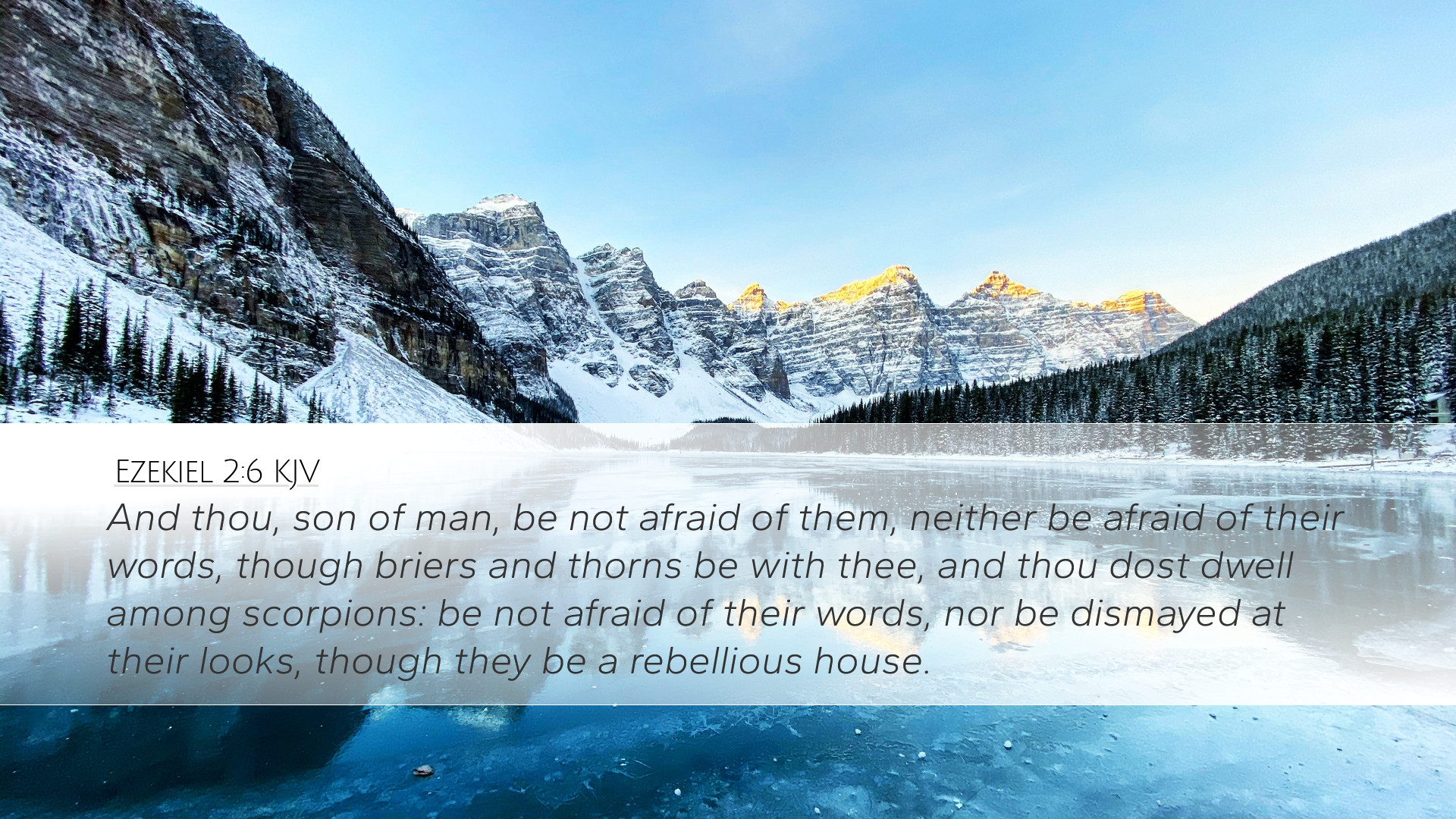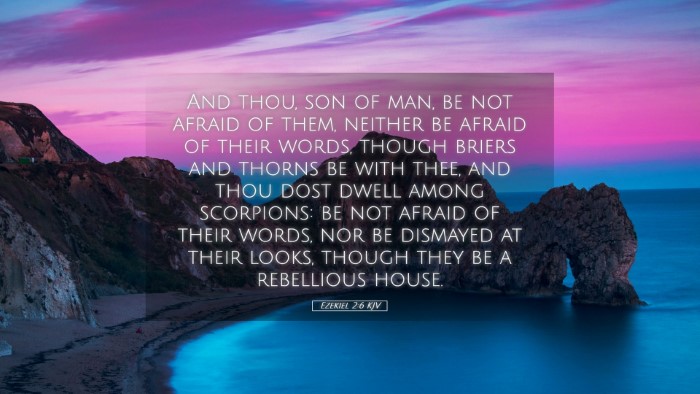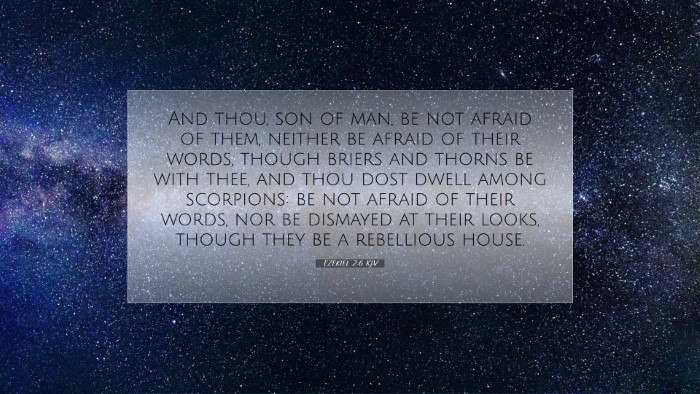Ezekiel 2:6 - Commentary Overview
Verse Context: Ezekiel 2:6 states, “And thou, son of man, be not afraid of them, neither be afraid of their words, though briers and thorns be with thee, and thou dost dwell among scorpions: be not afraid of their words, nor be dismayed at their looks, though they be a rebellious house.” This verse serves as a significant turning point in Ezekiel's prophetic ministry.
Historical and Literary Context
The book of Ezekiel is set during a tumultuous time in Israel’s history, marked by the Babylonian exile. Ezekiel, called by God to be a prophet, confronts a rebellious people who had turned from the covenant with God. This background is critical when interpreting the exhortation not to be afraid, as Ezekiel was sent to deliver a challenging message of repentance and judgment.
Key Themes
- The Call to Prophetic Ministry: God's commissioning of Ezekiel amidst a disobedient nation.
- Challenges of Prophecy: The difficulties inherent in delivering messages from God to a resistant audience.
- Encouragement Against Fear: Divine reassurances for prophets and messengers of God.
Commentary Insights
Matthew Henry's Commentary
Matthew Henry emphasizes the importance of God's command to Ezekiel not to fear the people he is called to address. He explains that the imagery of 'briers and thorns' and 'scorpions' serves to illustrate the challenges Ezekiel would face. According to Henry, these symbols imply a painful and difficult ministry, yet God's assurance empowers Ezekiel to remain resolute.
Henry further reflects on the significance of the phrase “rebellious house,” suggesting that Ezekiel's ministry is intensely connected to the people's hardened hearts. He points out the necessity for courage in the face of opposition, not only for Ezekiel but for all who would serve in God’s calling.
Albert Barnes' Notes on the Whole Bible
Albert Barnes elaborates on the phrases 'neither be afraid of their words' and 'though they be a rebellious house,' stressing that it was natural for Ezekiel to feel fear in light of the formidable task ahead. Barnes posits that this fear is rooted in the legitimacy of the challenges he would confront, including harsh criticism and hostility.
Furthermore, Barnes suggests that God’s command to not be afraid reflects His understanding of human emotion and the need for divine strength in overcoming intimidation. He points out that the assurance comes from recognizing that the opposition does not dictate the message; rather, it stems from God's authority.
Adam Clarke's Commentary
Adam Clarke provides an in-depth exploration of the symbolic language used in Ezekiel 2:6. He points out that the terms 'briers,' 'thorns,' and 'scorpions' capture the real dangers and difficulties that lay ahead for Ezekiel. Clarke explains that these represent both physical and spiritual challenges that could derail Ezekiel's mission.
Clarke also notes the notion of 'dismayed at their looks,' highlighting the importance of the internal fortitude that Ezekiel must cultivate to stand firm against judgmental eyes. Gods’ command against fear is thus a call to inner strength and steadfastness in the face of potential psychological and emotional strain.
Thematic Reflections
This verse presents a rich tapestry of themes that resonate with both ancient and contemporary audiences. The call to prophetic ministry, especially in a context filled with conflict and spiritual rebellion, serves as a timely reminder for modern-day believers, especially pastors and leaders.
Courage in Ministry
One of the most significant takeaways from Ezekiel 2:6 is the call to courage. Just as Ezekiel was tasked with conveying God’s message to a rebellious people, so too are modern-day believers called to speak truth in their contexts, often facing opposition. The call emphasizes that obedience to God supersedes the fear of man.
Understanding the Role of a Prophet
As future theologians and scholars study this passage, it is critical to explore the extensive role of a prophet. Similar to Ezekiel, prophets are often seen as bearers of uncomfortable truths. This passage challenges ministers to embrace their calling with an understanding that opposition will frequently arise but reassures them of God’s presence and strength.
The Nature of Rebellion
Ezekiel 2:6 serves as a precursor to understanding Israel's ongoing rebellion against God. Reflecting on this rebellion allows scholars to explore the connection between disobedience and the prophetic voice. The injunction for Ezekiel to confront this rebellion speaks volumes about the need for unwavering faithfulness to God’s message, despite the surrounding circumstances.
Conclusion
Ezekiel 2:6 encapsulates a profound encouragement for those engaged in ministry, underscoring the essential truths of courage, the nature of God’s call, and the reality of spiritual opposition. By synthesizing insights from commentaries, we recognize that God's call may lead us into the midst of challenges; however, His presence and strength provide the courage necessary to fulfill our duties. As leaders, mentors, and scholars, the teachings contained within this verse serve as a foundation upon which to build resilience and resolve amidst the complexities of a world that often stands in opposition to divine truth.


